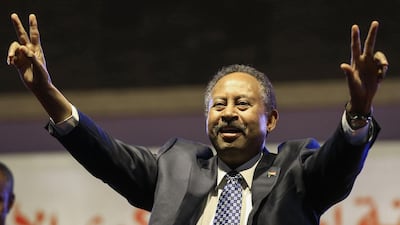For Prime Minister Abdalla Hamdok, Sudan’s “march of change” will not come to a halt, despite an assassination attempt targeting him on Monday. The failed attack in Khartoum left Mr Hamdok unscathed, and the Sudanese leader received the support and solidarity of friendly nations. The US condemned the assassination attempt, which Sheikh Mohamed bin Zayed, Crown Prince of Abu Dhabi and Deputy Supreme Commander of the UAE Armed Forces, described as “heinous”. “We stand with Sudan during this crisis” Sheikh Mohamed bin Zayed told Mr Hamdok in a phone call.
Sudanese authorities have launched an investigation into the unclaimed attack, while activists have warned that sympathisers of the deposed autocrat Omar Al Bashir might be attempting to derail the country’s transition process. In January, pro-Al Bashir militants clashed with Sudanese soldiers in the capital after a dispute over severance packages.
A few months after the fall of Al Bashir in April of last year, a power-sharing deal – between the powerful army and civilian leaders – landed Mr Hamdok, an economist who previously worked at the UN, the country's top job.
The agreement also gave a mixed military-civilian council mandate to rule for a little more than three years before free and fair elections are held. During that time, Mr Hamdok and his team are to help the country overcome a set of challenges, such as getting the nation removed from a US-terror listing, ending conflicts in the Western Darfur region and in the South, fighting corruption and boosting Sudan’s flailing economy. But while the new leaders in Khartoum plan for their country’s future, there are fears the former dictator’s loyalists may be plotting their downfall in the shadows – a scenario that has haunted Sudan for more than half a century.
Since independence in 1956, Sudan has witnessed several attempts at good governance thwarted by coups that instated ruthless dictatorships and hindered the country’s growth. Two year after the nation gained independence, General Ibrahim Abboud staged a coup d’etat against the country’s elected government. Sudan’s October Revolution ousted Abboud from power in 1964, giving way to four years of parliamentary democracy, before another military coup installed Colonel Gaafar Al Nimeiry as president for 16 years. Al Nimeiry was ousted by a new popular movement, the April intifada. But in 1989, Al Bashir staged a coup against Sudan’s elected government, ushering in an era of international isolation, repression and economic decay. The people of Sudan rose up against Al Bashir last year, ending his 30-year rule.
After half a century of violence, poverty and self-serving policies that took a toll on the Afro-Arab nation, Sudan’s peaceful revolution has given the country a chance to change the course of its destiny and be part of a globalised world. This time, history cannot be allowed to repeat itself.
Mr Hamdok has largely become the face of this positive change. Under his leadership, Washington and Khartoum exchanged ambassadors for the first time in 23 years. Sanctions have been lifted from 127 Sudanese companies, opening up the country to new opportunities.
Sudan’s ruling council has announced new measures to remove more loyalists of Al Bashir from positions of power in government entities, banks and embassies. Those who would like to see the hopes and dreams of the Sudanese crushed must be prevented from making a comeback.
Sudan must not fall back into a pattern of failed transition processes and coups especially now that it is on a path to success.


